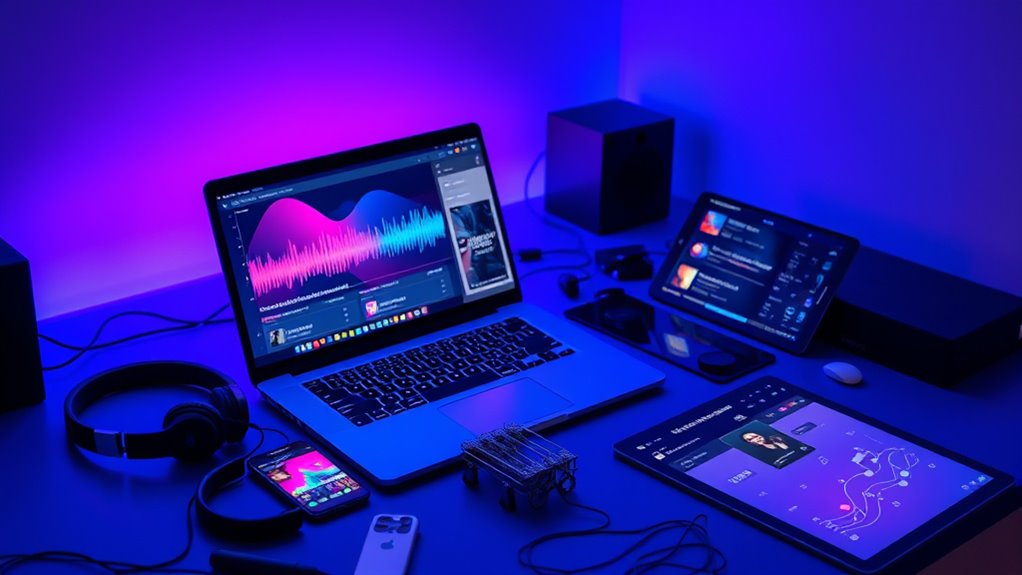Creating personalized playlists with machine learning involves analyzing your listening habits to generate tailored music recommendations that adapt over time. By recording actions like skips, pauses, and repeats, the system identifies your preferences and recognizes patterns such as favorite genres or moods. Advanced algorithms then curate playlists that align with your evolving tastes, ensuring a seamless listening experience. Keep exploring to discover how these smart systems continuously refine your musical journey for a truly personalized sound.
Key Takeaways
- Machine learning analyzes listening habits to generate tailored playlists that match individual preferences and moods.
- It collects user interaction data to build detailed profiles, predicting future music tastes accurately.
- Advanced algorithms identify complex genre preferences and find hidden song connections for seamless recommendations.
- The system continuously adapts, refining playlists based on evolving listening patterns and current user context.
- Personalized playlist creation enhances discovery, relevance, and user engagement through dynamic, data-driven suggestions.

In today’s digital music landscape, creating personalized playlists has become easier and more precise thanks to machine learning. You no longer have to sift through endless tracks manually or rely solely on basic genre tags. Instead, advanced algorithms analyze your listening habits to deliver music recommendations tailored specifically to your tastes. This shift is powered by user profiling, which forms the foundation of effective playlist curation. When you use a music streaming service, it constantly gathers data about your listening patterns—what genres you prefer, how often you skip songs, and which tracks you replay. Over time, this data creates a detailed profile of your musical preferences, enabling the platform to predict what you’ll enjoy next with remarkable accuracy.
Advanced algorithms analyze your listening habits to deliver personalized music recommendations with remarkable accuracy.
The process starts with data collection. Every time you hit play, pause, or skip, that action is recorded. The service then processes this information to identify patterns and trends unique to you. For example, if you often listen to indie rock on weekday mornings and jazz on weekends, the system recognizes these habits. Machine learning models use this user profiling to generate music recommendations that match your evolving tastes. They don’t just suggest popular tracks; they curate playlists that resonate with your specific mood, activity, or time of day, making your listening experience more personal and engaging. Additionally, these systems can adapt to changes in your preferences over time, ensuring your playlists stay aligned with your current mood or environment.
As your profile deepens, the system becomes more adept at understanding complex preferences. It learns not only your favorite genres but also the nuances within those genres—like your preference for upbeat indie tracks over mellow ones or your inclination toward certain artists. This insight allows the algorithms to find hidden connections between songs, introducing you to new music that fits seamlessly into your existing playlist. Essentially, machine learning personalizes your music experience by continuously refining its understanding of your preferences through user profiling. The more you listen, the smarter the system becomes, constantly adjusting recommendations to match your current mood or activity.
With this technology, you gain control over your musical journey. You can discover new artists and genres without manually searching, because the system intuitively knows what you’ll like. Creating personalized playlists becomes more than just a random selection; it transforms into a curated experience that feels uniquely yours. Thanks to machine learning-powered music recommendation systems, your playlists grow more accurate and enjoyable over time, making every listening session fresh, relevant, and tailored to your tastes. This ongoing learning process exemplifies how subconscious power during sleep can be harnessed indirectly through technology to enhance your personal experiences and preferences.
Top picks for "creat personaliz playlist"
Open Amazon search results for this keyword.
As an affiliate, we earn on qualifying purchases.
Frequently Asked Questions
How Does Machine Learning Handle New or Rare Songs?
When you encounter new or rare songs, machine learning faces the cold start problem and data sparsity. It struggles to recommend these tracks because there’s little user interaction data. To handle this, algorithms often use content-based features like genre or artist info or leverage collaborative filtering with similar users. This way, the system can suggest fresh songs even when limited data exists, making your playlists more diverse and personalized.
Can Users Influence Their Playlist Recommendations Directly?
Yes, you can influence your playlist recommendations directly. Your user preferences, like skips, likes, and listening habits, shape the algorithm’s choices, making your playlists more personalized over time. However, algorithm transparency varies; some platforms let you see how your actions impact suggestions, while others don’t. Stay aware—your interactions hold the power to fine-tune your music experience, revealing the hidden mechanics behind your evolving playlists.
What Privacy Measures Protect User Listening Data?
Your listening data is protected through robust privacy measures like data encryption, which secures your information from unauthorized access. Additionally, user anonymity is maintained by removing personally identifiable details, ensuring your identity stays private. These safeguards work together to keep your listening habits confidential while still allowing machine learning algorithms to personalize your playlists effectively. Rest assured, your data privacy remains a top priority in these systems.
How Often Do Playlist Algorithms Update?
You might think playlist algorithms update daily, but surprise! They usually refresh weekly or even monthly. This slow pace keeps users guessing, but don’t worry—your feedback and algorithm transparency efforts help speed things up. By sharing your preferences, you’re influencing updates, making playlists more personalized. So, keep giving feedback; it’s like nudging your playlist to evolve faster than a snail on a treadmill!
Are Personalized Playlists Available Offline?
Yes, personalized playlists can be available offline. You can enable offline access by caching your playlist, which stores the songs locally on your device. This way, you can enjoy your curated playlist even without an internet connection. Just make sure to download or cache the playlist beforehand, so all the tracks are accessible offline. This feature guarantees you have continuous access to your personalized music experience anytime, anywhere.
Conclusion
By leveraging machine learning, you can create playlists that feel like a personal DJ, perfectly tuned to your tastes. It’s like having a music soulmate who always knows what to play next. As you continue to refine these algorithms, your listening experience becomes more seamless and enjoyable. Embrace this technology to uncover new musical discoveries and deepen your connection to your favorite songs. Just like a good playlist, it’s all about making your musical journey uniquely yours.









